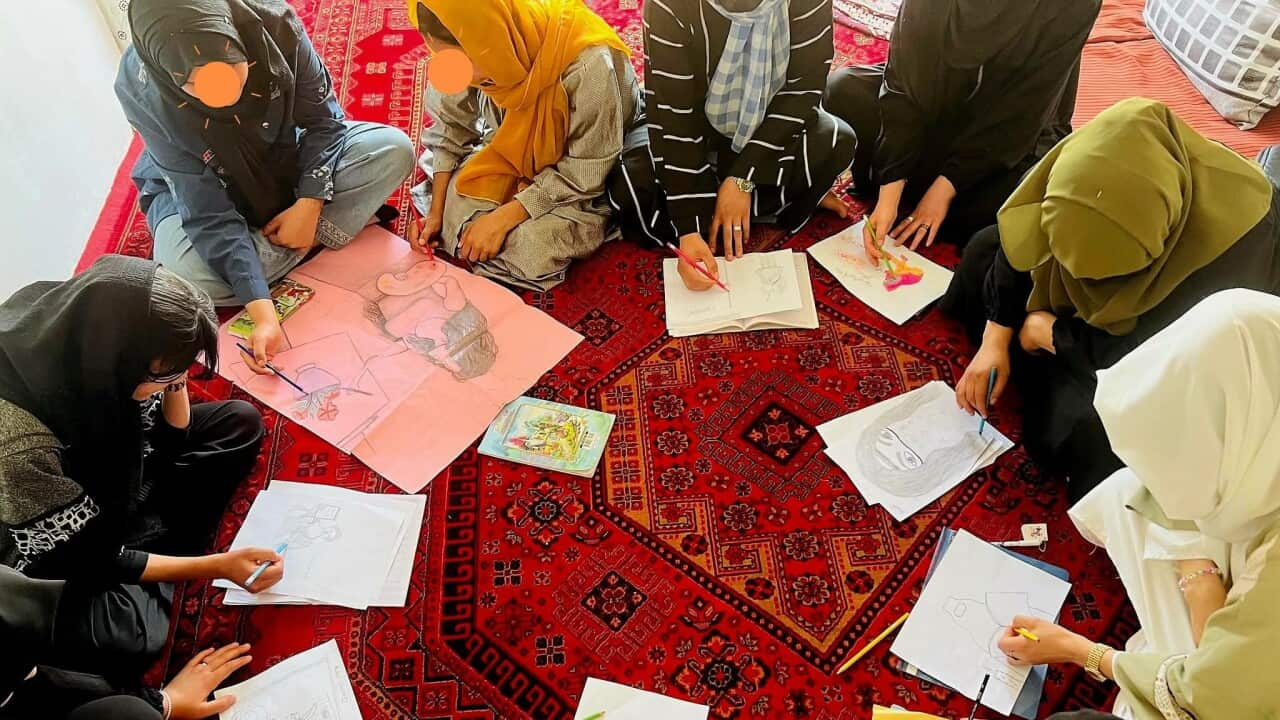An Australian resident who is helping Afghan girls study in secret online from his home in Adelaide fears a new Taliban-imposed internet blackout will hurt vulnerable students.
Last week, the Taliban shut down the internet in five provinces in the north of Afghanistan in a move the militant group said was to prevent "immoral activities".
Afghans in Australia and worldwide are concerned about the impact the shutdown could have on their families.
Some told SBS News the internet was a lifeline, especially for women, in a country where they are increasingly being "erased" from public life.
'Deliberately designed to isolate girls'
Erfan Abidi moved to Adelaide in 2021 from Afghanistan. He had previously worked as an interpreter and cultural adviser for NATO forces and later for the Afghan interior ministry. But after the Taliban's takeover, his family was evacuated to Australia.
Abidi, a recipient of the UNESCO Adelaide Chamber Human Rights Award and a refugee ambassador for the Refugee Council of Australia, founded an underground network of schools in Afghanistan after the Taliban banned girls from education in 2021.
He told SBS News he started the initiative when he realised that millions of girls had suddenly been stripped of their right to learn.

"The aim was to advocate, educate and empower girls even under strict restrictions and limited resources, while also drawing global attention to this cruel decision," he said.
The Empowerment Network 132 connects hundreds of girls across Afghanistan who are studying either in secret schools on the ground in Afghanistan or online. The network is community-driven and relies on small donations.
"Beyond education, we also support girls with counselling, mental health programs, suicide prevention education, empowerment workshops, and opportunities to stay socialised and connected," Abidi said.
The online teachers are based in different countries, including Australia, the United States, and Europe, and connect with students in Afghanistan using secure apps and platforms.
Abidi said the recent internet ban by the Taliban has been devastating, and his network is trying to expand home schools on the ground.
"Online education was the last hope for thousands of girls, and now even that is being taken away. We have lost contact with many of our students and teachers," he said.
"Some try to work around this by using preloaded data on memory cards or USBs, but most families cannot afford such tools.
"These blackouts are deliberately designed to isolate girls and prevent the world from seeing what is happening inside Afghanistan."
'Vital lifeline for the people'
The Taliban administration announced the internet ban across the northern provinces of Afghanistan last week, citing the need "to prevent immoral activities".
The restriction came into effect last week and is limited to all connections via fibre-optic cable, officials said.
It leaves offices, homes and other businesses without an internet connection. However, internet access on cell phone data will be available, officials said.
The new ban covers five provinces in the north of the country — Kunduz, Badakhshan, Baghlan, Takhar and Balkh.
Nasir Ahmad Haidarzai is a PhD candidate at the University of Southern Queensland and is originally from the Balkh province in northern Afghanistan.
He told SBS Pashto that he has been unable to contact his brother due to the internet ban.
"Internet connection is a vital lifeline for the people of Afghanistan, including Balkh province, where I come from, linking local communities with the rest of the world.
"For many, especially youth and women, online access is the only way to study, gain knowledge and engage with the wider world."
'Inhuman and dangerous'
The Taliban has previously voiced concern over pornography and flirtation between men and women online.
The hardline political and militant movement formally codified a long set of rules governing morality late last year, ranging from requiring women to cover their faces and men to grow beards to banning car drivers from playing music.
Women have been banned from working in various fields and attending universities, and girls have been banned from attending high schools.
"This measure has been taken to prevent immoral activities," the official statement said, adding that an alternative will be provided for essential needs.
Former US ambassador to Afghanistan Zalmay Khalilzad said the ban was absurd.
"If pornography is really the concern, like as in many Islamic countries, it can easily be filtered. Many countries in the Islamic world do exactly that," he said.
Khalid Amiri is an Afghan journalist who was evacuated to Australia after the Taliban came to power in 2021.
He told SBS Pashto the ban further isolates Afghans, calling it "extremely inhuman, dangerous, and dictatorial".
"It particularly affects the Afghan diaspora in countries like Australia and across the West, where families remain separated since the Taliban takeover.
"Many fled, leaving loved ones behind and their only means of communication has been through applications like WhatsApp and Signal. I think with this ban, even that lifeline has been cut off completely."
This story was produced in collaboration with SBS Pashto, with additional reporting by Reuters.
For the latest from SBS News, download our app and subscribe to our newsletter.

